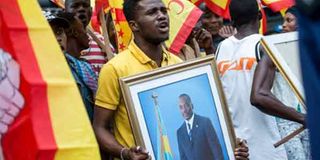UN, AU call for transfer of power in DR Congo

A supporter of President of the Democratic Republic of Congo, Joseph Kabila holds a picture of the president as people gather outside parliament, where the president holds his state-of-the-nation speech, in Kinshasa on July 19, 2018. Kabila kept his country guessing on July 19 over his political plans five months ahead of crucial elections. In a state-of-the-nation speech that had sparked intense speculation of an announcement, Kabila vowed to stand by the December 23 date for the poll, and "unequivocally respect the constitution". But, in a long speech enumerating his government's policies, Kabila did not spell out whether he would seek a new term in office.
Junior D. KANNAH / AFP
What you need to know:
- After meeting at UN headquarters in New York, the UN Security Council and the African Union's Peace and Security Council said in a joint statement that the December 23 elections "must lead to a peaceful and democratic transfer of power, in accordance with the constitution."
The top security bodies of the United Nations and the African Union on Thursday called for a peaceful transfer of power following elections in the Democratic Republic of Congo this year.
After meeting at UN headquarters in New York, the UN Security Council and the African Union's Peace and Security Council said in a joint statement that the December 23 elections "must lead to a peaceful and democratic transfer of power, in accordance with the constitution."
Hours earlier, President Joseph Kabila delivered a state of the union address in which he vowed to "unequivocally respect the constitution" but did not clearly state that he would not seek re-election.
In power since 2001, Kabila has faced calls from the United States, France and Britain for him to clearly state that he will step aside and not run in the December polls.
The joint UN-AU statement threatened "appropriate measures against all Congolese actors" who impede the organization of the elections.
Candidates have until August 8 to register for the presidential vote.
Kabila has kept power thanks to a constitutional clause enabling him to stay in office until a successor is elected.
Fresh elections should have been held in December 2016, but were then postponed until 2017 and are now scheduled to be held on December 23.
UN Secretary-General Antonio Guterres has postponed a visit to the DR Congo to allow Kabila to decide on his political future without the appearance that he is a target of international pressure.
The Security Council is also considering a visit to the DR Congo amid concerns that the country could slide into violence as it prepares for the vote.
The DR Congo hosts the UN's biggest peacekeeping mission, MONUSCO, with some 17,500 troops and police.



